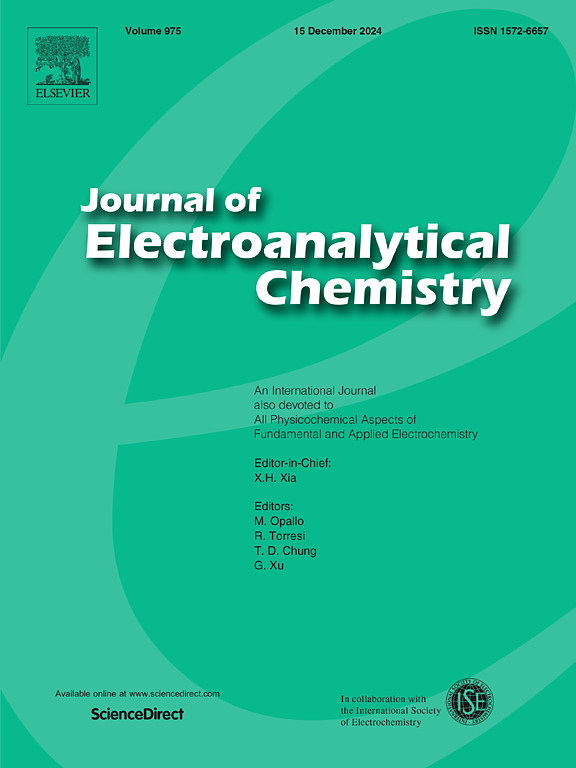Electrochemical hydrogen evolution reaction enhanced by dynamic bubble-template synthesized CoP/NiCu/Cu catalysts
IF 4.1
3区 化学
Q1 CHEMISTRY, ANALYTICAL
引用次数: 0
Abstract
In this research, a new CoP/NiCu composite was synthesized using an efficient and fast two-step electrodeposition method and employed as an advanced electrocatalyst for the hydrogen evolution reaction (HER). Initially, a cedar-leaf-like NiCu structure was fabricated on a copper sheet substrate, followed by the electrodeposition of CoP nanosheets onto the NiCu layer, forming a hierarchical heterostructure. Optimization of deposition potential (−1.2 V) and duration (1800 s) led to an electrode with significant catalytic properties, porosity, and enhanced wettability. The optimized CoP/NiCu/Cu electrode demonstrated excellent performance for HER in 1 M of NaOH with the overpotential of −228 mV and − 64 mV at current densities of −100 and − 10 mA. cm−2, respectively. Stability tests under industrial-scale conditions confirmed the electrode's robustness over 12 h of operation. The synergistic integration of NiCu and CoP layers enhanced electron transfer, increased active site exposure, and improved catalytic efficiency, positioning the CoP/NiCu/Cu electrode as a promising candidate for practical hydrogen production applications.

动态气泡模板合成CoP/NiCu/Cu催化剂促进电化学析氢反应
本研究采用高效、快速的两步电沉积方法合成了一种新型的CoP/NiCu复合材料,并将其作为析氢反应(HER)的高级电催化剂。首先,在铜片衬底上制备雪松叶状NiCu结构,然后在NiCu层上电沉积CoP纳米片,形成层次化异质结构。优化沉积电位(−1.2 V)和持续时间(1800 s),使电极具有显著的催化性能、孔隙度和增强的润湿性。优化后的CoP/NiCu/Cu电极在- 100和- 10 mA电流密度下,在1 M NaOH中表现出优异的HER性能,过电位为- 228 mV和- 64 mV。厘米−2,分别。工业规模条件下的稳定性测试证实了电极在12小时的运行中具有稳健性。NiCu和CoP层的协同集成增强了电子转移,增加了活性位点暴露,提高了催化效率,使CoP/NiCu/Cu电极成为实际制氢应用的有前途的候选电极。
本文章由计算机程序翻译,如有差异,请以英文原文为准。
求助全文
约1分钟内获得全文
求助全文
来源期刊
CiteScore
7.80
自引率
6.70%
发文量
912
审稿时长
2.4 months
期刊介绍:
The Journal of Electroanalytical Chemistry is the foremost international journal devoted to the interdisciplinary subject of electrochemistry in all its aspects, theoretical as well as applied.
Electrochemistry is a wide ranging area that is in a state of continuous evolution. Rather than compiling a long list of topics covered by the Journal, the editors would like to draw particular attention to the key issues of novelty, topicality and quality. Papers should present new and interesting electrochemical science in a way that is accessible to the reader. The presentation and discussion should be at a level that is consistent with the international status of the Journal. Reports describing the application of well-established techniques to problems that are essentially technical will not be accepted. Similarly, papers that report observations but fail to provide adequate interpretation will be rejected by the Editors. Papers dealing with technical electrochemistry should be submitted to other specialist journals unless the authors can show that their work provides substantially new insights into electrochemical processes.

 求助内容:
求助内容: 应助结果提醒方式:
应助结果提醒方式:


